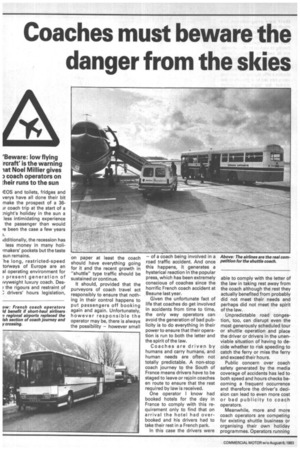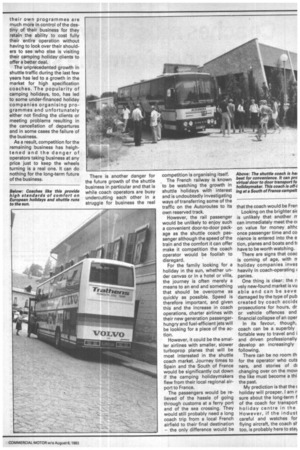Coaches must beware the danger from the skies
Page 20

Page 21

If you've noticed an error in this article please click here to report it so we can fix it.
IEOS and toilets, fridges and verys have all done their bit make the prospect of a 36jr coach trip at the start of a :night's holiday in the sun a less intimidating experience the passenger than would ee been the case a few years ).
dditionally, the recession has less money in many holi(makers' pockets but the taste sun remains.
'he long, restricted-speed torways of Europe are an al operating environment for present generation of ivyweight luxury coach. Des the rigours and restraint of 2 drivers' hours legislation, on paper at least the coach should have everything going for it and the recent growth in "shuttle" type traffic should be sustained or continue.
It should, provided that the purveyors of coach travel act responsibly to ensure that nothing in their control happens to put passengers off booking again and again. Unfortunately, however responsible the operator may be, there is always the possibility — however small — of a coach being involved in a road traffic accident. And once this happens, it generates a hysterical reaction in the popular press, which has been extremely conscious of coaches since the horrific French coach accident at Beaune last year.
Given the unfortunate fact of life that coaches do get involved in accidents from time to time, the only way operators can avoid the generation of bad publicity is to do everything in their power to ensure that their operation is run to both the letter and the spirit of the law.
Coaches are driven by humans and carry humans, and human needs are often not totally predictable. A non-stop coach journey to the South of France means drivers have to be staged to leave or rejoin coaches en route to ensure that the rest required by law is received.
One operator I know had booked hotels for the day in France to comply with this requirement only to find that on arrival the hotel had overbooked and his drivers had to take their rest in a French park.
In this case the drivers were able to comply with the letter of the law in taking rest away from the coach although the rest they actually benefited from probably did not meet their needs and perhaps did not meet the spirit of the law.
Unpredictable road congestion, too, can disrupt even the most generously scheduled tour or shuttle operation and place the driver or drivers in the unenviable situation of having to decide whether to risk speeding to catch the ferry or miss the ferry and exceed their hours.
Public concern over coach safety generated by the media coverage of accidents has led to both speed and hours checks becoming a frequent occurrence and therefore the driver's decision can lead to even more cost or bad publicity to coach operators.
Meanwhile, more and more coach operators are competing for existing shuttle business or organising their own holiday programmes. Operators running their own programmes are much more in control of the destiny of their business for they retain the ability to cost fully their entire operation without having to look over their shoulders to see who else is visiting their camping holiday clients to offer a better deal.
The unprecedented growth in shuttle traffic during the last few years has led to a growth in the market for high specification coaches. The popularity of camping holidays, too, has led to some under-financed holiday companies organising programmes and unfortunately either not finding the clients or meeting problems resulting in the cancellation of departures and in some cases the failure of the business.
As a result, competition for the remaining business has heightened and the danger of operators taking business at any price just to keep the wheels turning is a real one. It can do nothing for the long-term future of the business. There is another danger for the future growth of the shuttle business in particular and that is while coach operators are busy undercutting each other in a struggle for business the real competition is organising itself.
The French railway is known to be watching the growth in shuttle holidays with interest and is undoubtedly investigating ways of transferring some of the traffic on the Autoroutes to its own reserved track.
However, the rail passenger would be unlikely to enjoy such a convenient door-to-door package as the shuttle coach passenger although the speed of the train and the comfort it can offer make it competition the coach operator would be foolish to disregard.
For the family looking for a holiday in the sun, whether under canvas or in a hotel or villa, the journey is often merely a means to an end and something that should be overcome as quickly as possible. Speed is therefore important, and given this and the increase in coach operations, charter airlines with their new generation passengerhungry and fuel-efficient jets will be looking for a piece of the action.
However, it could be the smaller airlines with smaller, slower turboprop planes that will be most interested in the shuttle coach market. Journey times to Spain and the South of France would be significantly cut down if the camping holidaymakers flew from their local regional airport to France.
The passengers would be relieved of the hassle of going through customs at a ferry port and of the sea crossing. They would still probably need a long coach trip from a local French airfield to their final destination — the only difference would be that the coach would be Fren
Looking on the brighter sic is unlikely that another ncan immediately meet the cc on value for money althc once passenger time and co nience is entered into the e tion, planes and boats and ti have to be worth watching.
There are signs that coac is coming of age, with rr holiday companies inves heavily in coach-operating panies.
One thing is clear: the n vely new-found market is vu able and can be seve 'damaged by the type of pub created by coach accidE prosecutions for hours, dr or vehicle offences and financial collapse of an oper In its favour, though, coach can be a superbly fortable way to travel and i and driven professionally develop an increasingly following.
There can be no room th for the operator who cuts ners, and stories of di changing over on the mov( the like must become a thi the past.
My prediction is that the c holiday will prosper. I am r sure about the long-term f of the coach for transport holiday centre in the However, if the indust careful and watches for flying aircraft, the coach sltoo, is probably here to staN
































































































